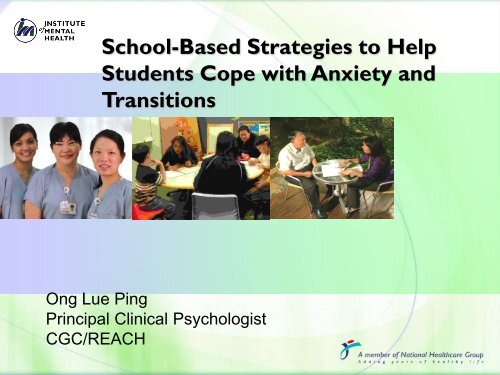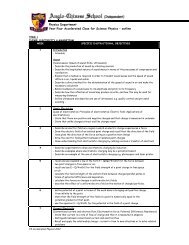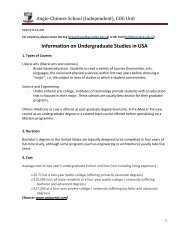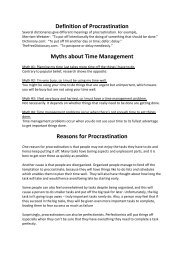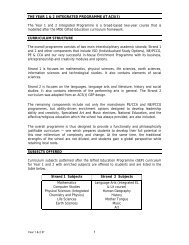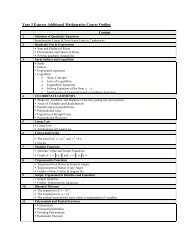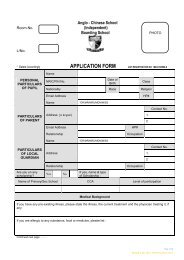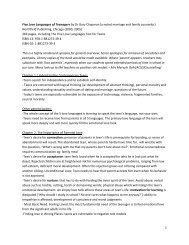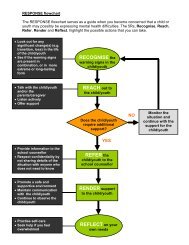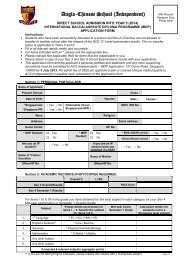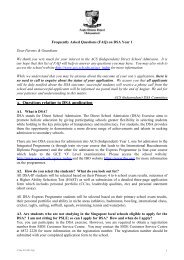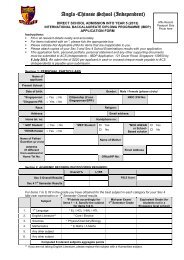School-Based Strategies to Help Students Cope with Anxiety ... - Sites
School-Based Strategies to Help Students Cope with Anxiety ... - Sites
School-Based Strategies to Help Students Cope with Anxiety ... - Sites
Create successful ePaper yourself
Turn your PDF publications into a flip-book with our unique Google optimized e-Paper software.
<strong>School</strong>-<strong>Based</strong> <strong>Strategies</strong> <strong>to</strong> <strong>Help</strong><br />
<strong>Students</strong> <strong>Cope</strong> <strong>with</strong> <strong>Anxiety</strong> and<br />
Transitions<br />
Ong Lue Ping<br />
Principal Clinical Psychologist<br />
CGC/REACH
Overview<br />
Common strategies for dealing <strong>with</strong> anxiety in<br />
students: Advantages & Disadvantages<br />
Tips for helping students cope <strong>with</strong> transitions and<br />
anxiety<br />
Useful resources<br />
Q & A
Common anxiety management strategies<br />
• Think back <strong>to</strong> the most recent time you<br />
encountered a student exhibiting some<br />
anxiety in class/school.<br />
• What do you do?<br />
• Was it helpful for the student at that time?<br />
• Did your actions help the student cope <strong>with</strong><br />
anxiety better the next time?
Common anxiety management strategies<br />
• Reassure the student.<br />
• Calm student for a while.<br />
• The more reassurances the teachers/counselors<br />
give, the more assurances the student will demand<br />
in the future.<br />
• If reassurances are given repeatedly, it may<br />
become a form of positive attention <strong>to</strong> the student,<br />
which will reinforce the student’s anxiety.
Common anxiety management strategies<br />
• Tell the student exactly what <strong>to</strong> do.<br />
• <strong>Help</strong> the student <strong>to</strong> cope <strong>with</strong> the situation in the<br />
short-term.<br />
• Reliance on adult direction may be a subtle form<br />
of avoidance.<br />
• No immediate need for student <strong>to</strong> learn how <strong>to</strong><br />
manage his/her anxiety.
Common anxiety management strategies<br />
• Talk about what makes you anxious<br />
• Normalize anxiety for student.<br />
• Student may model the anxiety instead.
Common anxiety management strategies<br />
• Prevent the student’s avoidance of feared<br />
situations<br />
• Child has the opportunity <strong>to</strong> see that he/she can<br />
cope <strong>with</strong> their anxiety by facing up <strong>to</strong> the feared<br />
situations.<br />
• More effective in the long-run.<br />
• Difficult and stressful for teacher/counselor <strong>to</strong> see<br />
student in distress.
Common anxiety management strategies<br />
• Permit the student’s avoidance of feared<br />
situations<br />
• Immediate reduction in student’s anxiety and<br />
distress.<br />
• Teachers/counselors will make themselves popular<br />
<strong>with</strong> their child.<br />
• Student never learns how <strong>to</strong> cope <strong>with</strong> anxiety.
Common anxiety management strategies<br />
• Ignore the student’s anxiety<br />
• No risk of adult attention rewarding or<br />
encouraging anxiety.<br />
• Student may feel “abandoned” in times of need.
Common anxiety management strategies<br />
• Prompt the student <strong>to</strong> cope constructively<br />
<strong>with</strong> their anxiety<br />
• Shows faith in student’s ability <strong>to</strong> cope<br />
independently.<br />
• Student learns <strong>to</strong> manage anxiety on his/her own.<br />
• Takes time and patience.
Tips for helping students cope <strong>with</strong> transition<br />
• What is a transition?<br />
• What are the typical transitions in a student’s<br />
life?<br />
• What other possible atypical transitions may<br />
a student face?<br />
• Think back <strong>to</strong> the time when you were:<br />
• On the first day of secondary school<br />
• How do you feel?<br />
• What helped you coped <strong>with</strong> your<br />
apprehension then?<br />
• What made you more anxious/worried then?
Tips for helping students cope <strong>with</strong> transition/anxiety<br />
BE<br />
WATCHFUL
Tips for helping students cope <strong>with</strong> transition/anxiety<br />
• Be prepared<br />
Prepare the student and parents in advance as<br />
much as possible.<br />
Provide information on the new<br />
situation/environment and the<br />
timetable/schedule for the first day/week.<br />
Provide avenue for the student/parents <strong>to</strong> seek<br />
more information/help.
Tips for helping students cope <strong>with</strong> transition/anxiety<br />
• Engineer social support<br />
Have a buddy system<br />
Create opportunities <strong>to</strong> interact during recess<br />
Let the student know how <strong>to</strong> seek the form<br />
teacher/FTSC for help
Tips for helping students cope <strong>with</strong> transition/anxiety<br />
• Watch out for symp<strong>to</strong>ms of anxiety in your<br />
student<br />
As anxious children tend <strong>to</strong> keep their problems <strong>to</strong><br />
themselves and are generally well behaved and<br />
quiet in class, their anxiety problems are often<br />
overlooked until they start <strong>to</strong> greatly affect the<br />
students functioning in school.<br />
Be alert <strong>to</strong> behavioral and physical signs of<br />
anxiety such as increasing avoidance of feared<br />
situations and complaints of s<strong>to</strong>machache,<br />
headaches or chest discomfort etc.
Key questions <strong>to</strong> ask myself<br />
• Does my student show signs of avoidance in<br />
class and in school?<br />
• Does my student exhibit symp<strong>to</strong>ms of anxiety<br />
especially in situations that is uncomfortable<br />
<strong>to</strong> the student?<br />
• Headache or s<strong>to</strong>machache<br />
• Nausea<br />
• Vomiting<br />
• Shortness of breath/ dizziness<br />
• Heart palpitations<br />
• Muscle tension/ trembling<br />
• Poor concentration<br />
• Restlessness<br />
• Irritability<br />
• Fatigue
Key questions <strong>to</strong> ask myself<br />
• Does my student worry a lot and focus only<br />
on negative outcomes?<br />
• Is my student underperforming?
Tips for helping students cope <strong>with</strong> transition/anxiety<br />
• Acknowledge your student’s anxiety and<br />
provide a listening ear<br />
Validate your student’s feelings. Do not dismiss<br />
their anxiety immediately.<br />
Whenever possible, listen <strong>to</strong> your student’s<br />
thoughts and feelings first <strong>with</strong>out any<br />
interruption. This allows your student <strong>to</strong> feel that<br />
you are concerned about him/her and what he/she<br />
is going through. This will encourage your student<br />
<strong>to</strong> reveal <strong>to</strong> you more about his/her fears.
Tips for helping students cope <strong>with</strong> transition/anxiety<br />
• Try <strong>to</strong> avoid giving excessive reassurances<br />
Resist giving reassurances repeatedly as it may<br />
become a form of positive attention for the<br />
student, which may encourage the student <strong>to</strong><br />
exhibit more anxious behaviors.
Tips for helping students cope <strong>with</strong> transition/anxiety<br />
• Calmly react <strong>to</strong> your student’s anxiety<br />
By responding <strong>to</strong> your student’s anxiety in a calm<br />
manner, this not only helps reduce your student’s<br />
perception of his/her fears as being threatening but<br />
also allows your student <strong>to</strong> model how you can<br />
cope <strong>with</strong> anxiety calmly.
Tips for helping students cope <strong>with</strong> transition/anxiety<br />
• <strong>Help</strong> your student understand about his/her<br />
anxiety<br />
Educate your student that his/her anxiety and the<br />
physical symp<strong>to</strong>ms of anxiety that he/she is<br />
experiencing is normal, harmless and temporary.<br />
Let your student know that she is not alone in<br />
feeling anxious and that most children have<br />
anxiety problems at some point in their lives.
Tips for helping students cope <strong>with</strong> transition/anxiety<br />
• Furnish your child <strong>with</strong> relaxation strategies<br />
Teach your child how <strong>to</strong> stay calm and reduce<br />
his/her physical symp<strong>to</strong>ms of anxiety through<br />
deep-breathing exercise.<br />
Deep breathing exercise
Tips for helping students cope <strong>with</strong> transition/anxiety<br />
• Use cognitive strategies such as coping<br />
statements and realistic thinking<br />
Develop coping statements <strong>with</strong> your students.<br />
For older students, you can teach your child <strong>to</strong><br />
challenge his/her anxious or negative thoughts and<br />
change them <strong>to</strong> more realistic ones<br />
After helping the student <strong>to</strong> identify his/her anxious<br />
thoughts, get the student <strong>to</strong> consider these questions:<br />
- Is there any evidence for/against this thought?<br />
- What are some possible alternative explanations?<br />
- What will I advise my friend who is in a similar situation?
Tips for helping students cope <strong>with</strong> transition/anxiety<br />
• Let your student face his/her fear gradually<br />
Encourage your student <strong>to</strong> use his/her relaxation<br />
exercises and/or cognitive strategies <strong>to</strong> overcome<br />
his/her fears or anxieties.<br />
Start <strong>with</strong> a situation that the student feels a bit<br />
anxious. After the student gains confidence that<br />
he/she can manage his/her anxiety in that<br />
situation, proceed gradually <strong>to</strong> situations that<br />
evoke greater levels of anxiety.<br />
Give your student lots of praise for trying <strong>to</strong><br />
overcome his/her anxiety.
Useful resources<br />
www.roc-n-ash.com<br />
www.anxietybc.com
Q & A<br />
Thank You


